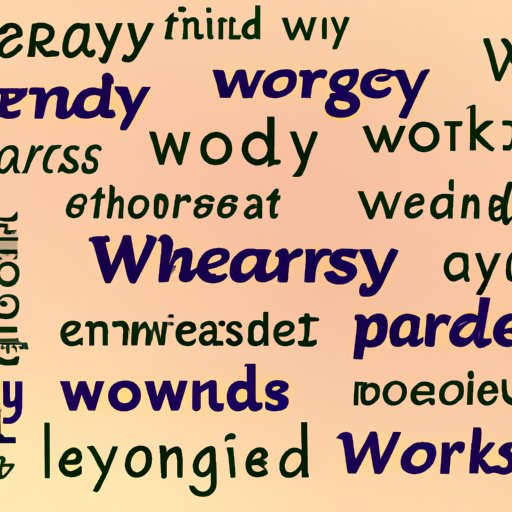Introduction
Wordiness is the use of too many unnecessary words in a sentence or paragraph that makes the writing unclear and difficult to understand. It can also make your writing seem dull and repetitive. To ensure that your writing is clear, concise and interesting, it is important to fix wordiness in your writing. In this article, we will explore some tips, strategies and examples for fixing wordiness in writing.
Use Strong, Clear Verbs
Using strong, clear verbs is one of the most effective ways to avoid wordiness in your writing. Strong verbs are more specific and descriptive than weak verbs, which can make your writing sound more interesting and engaging. Additionally, strong verbs can help you reduce the number of words in your writing, making it more concise and easy to read.
For example, instead of saying “He made a decision”, you could say “He decided”. Instead of saying “She gave an explanation”, you could say “She explained”. By using strong, clear verbs, you can convey the same meaning in fewer words.

Keep Sentences to a Maximum of 20 Words
Another way to fix wordiness in your writing is to keep your sentences to a maximum of 20 words. Longer sentences can be difficult to understand and make your writing seem dull and uninteresting. Short sentences, on the other hand, are easier to read and can give your writing more energy and flow.
To keep your sentences short, try to focus on one main idea per sentence. Additionally, avoid adding unnecessary details or information that doesn’t contribute to the overall message. Finally, look for opportunities to combine multiple sentences into one, as this can help reduce wordiness in your writing.
Avoid Using Jargon and Technical Terms
Jargon and technical terms can make your writing difficult to understand and often lead to wordiness. Jargon refers to specialized language used by a particular group or profession, while technical terms are words or phrases related to a specific field or subject. While these terms may be necessary in certain contexts, they should be avoided in general writing.
To avoid using jargon and technical terms, focus on using simple, everyday language that anyone can understand. Additionally, if you need to use a technical term, make sure to explain it in plain language. This will help ensure that your readers can easily understand your writing.
Use Active Voice Instead of Passive Voice
Using active voice instead of passive voice is another effective way to reduce wordiness in your writing. Active voice is when the subject of the sentence performs the action, while passive voice is when the subject receives the action. For example, in the sentence “The ball was thrown by him”, the subject (him) is receiving the action (thrown).
Active voice is usually shorter and more direct than passive voice, making it easier to read and understand. Additionally, active voice can help make your writing more lively and engaging. Whenever possible, try to use active voice instead of passive voice to reduce wordiness in your writing.

Vary Sentence Length for More Interesting Writing
Varying sentence length is another way to make your writing more interesting and reduce wordiness. Longer sentences can provide more detail and context, while shorter sentences can add emphasis and break up longer passages. By using a mix of both long and short sentences, you can create a more dynamic and engaging piece of writing.
When varying sentence length, focus on making each sentence as concise as possible. Additionally, try to avoid repeating the same structure for each sentence, as this can make your writing monotonous. Finally, look for opportunities to combine multiple sentences into one, as this can help keep your writing interesting and reduce wordiness.
Replace Adverbs with More Descriptive Words
Adverbs are words that modify or describe verbs, adjectives, or other adverbs. While they can be useful in some cases, they can also lead to wordiness in your writing. To avoid this, try to replace adverbs with more descriptive words that convey the same meaning. For example, instead of saying “He ran quickly”, you could say “He dashed”.
Replacing adverbs with more descriptive words can help make your writing more vivid and engaging. Additionally, it can help reduce the number of words in your writing, making it more concise and easier to read. Whenever possible, try to use descriptive words instead of adverbs to reduce wordiness in your writing.

Read Through Your Writing to Identify Unnecessary Words
Finally, reading through your writing can help you identify unnecessary words that can be removed to reduce wordiness. As you read through your writing, look for words or phrases that don’t add any value to the overall message. If they don’t contribute to the meaning of the sentence, remove them to make your writing more concise.
Additionally, look for opportunities to combine multiple sentences into one, as this can help reduce wordiness in your writing. Finally, look for words that can be replaced with shorter alternatives, such as replacing “in order to” with “to”. This can help make your writing more concise and easier to read.
Conclusion
In conclusion, wordiness can make your writing dull and difficult to understand. To ensure that your writing is clear, concise and interesting, it is important to fix wordiness in your writing. Some tips, strategies and examples for fixing wordiness include using strong, clear verbs; keeping sentences to a maximum of 20 words; avoiding jargon and technical terms; using active voice instead of passive voice; varying sentence length for more interesting writing; replacing adverbs with more descriptive words; and reading through your writing to identify unnecessary words.
(Note: Is this article not meeting your expectations? Do you have knowledge or insights to share? Unlock new opportunities and expand your reach by joining our authors team. Click Registration to join us and share your expertise with our readers.)
